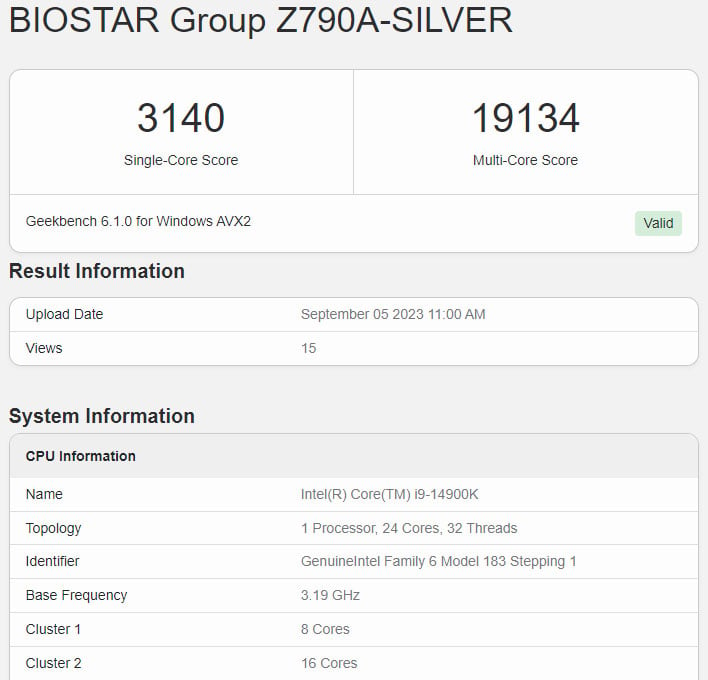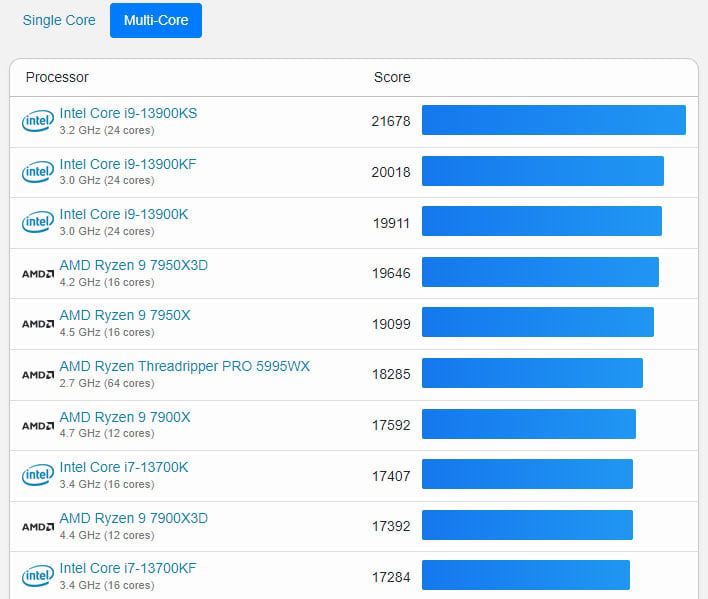It could be another couple of weeks before Intel formally introduces its 14th Gen Core desktop processors, otherwise known as Raptor Lake-S Refresh. In the meantime, more leaks are piling up. The newest one is a small set of single-core and multi-core benchmark runs in Geekbench 6 for the
Core i9-14900K, which is set to ascend into flagship status when it arrives.
In case you haven't been keeping tabs on Intel's technically next-gen CPUs, Raptor Lake-S Refresh is exactly what it sounds like—a refresh of Raptor Lake. While they are expected to carry the 14th Gen designation, the underlying architecture is the same as Intel's 13th Gen Core Raptor Lake-S processors. So, what exactly is different?
For the most part, you're looking at faster clock speeds. It's also been reported that at least one of the upcoming SKUs will feature more E-cores than its 13th Gen equivalent. As it pertains to the Core i9-14900K, however, it will debut with the same 24-core/32-thread configuration as the
Core i9-13900K, which is broken up into 8 P-cores with Hyper Threading support and 16 E-cores.
While nothing is official, leaks and rumors point to the Core i9-14900K as having a 6GHz max Turbo frequency via Thermal Velocity Boost. With sufficient cooling and power delivery, the next-gen chip will be able to temporarily boost 200MHz higher than the Core i9-13900K.
A recent CPU-Z benchmark leak showed a supposed Core i9-14900K posting an 8.4% faster single-score score and 8.6% higher multi-core score in the utility's built-in benchmark, compared to its predecessor. Now we have some Geekbench 6 benchmarks to digest.
The best of the small bunch is shown above. According to the database entry, we're looking at a Core i9-14900K running in a Biostar Z790A-Silver motherboard with 16GB of DDR5-4800 memory. It scored 3,140 in the single-core test and 19,134 in the multi-core test.
Geekbench also maintains a list of average scores for various processors, which makes it somewhat easy to compare results.
"To make sure the results accurately reflect the average performance of each processor, the chart only includes processors with at least five unique results in the Geekbench Browser," Geekbench states.
Disclaimer out of the way, the Core i9-13900K averages 2,953 for the single-core test and 19,911 for the multi-core test. Using those figures, the leaked Core i9-14900K scored 6.3% higher in the single-core test while the Core i9-13900K actually beat its successor by 4.1% in the multi-core test.
The multi-core disparity is even bigger if we look at the average result for the Core i9-13900KS, which also boasts a 6GHz max Turbo clock—its average score is 21,678, which is 13.3% higher than the leaked Core i9-14900K benchmark run.
We caution against putting too much stock into any early benchmark results, including this
Geekbench entry. There's too much information lacking, such as the cooling scheme, driver situation, and other testing conditions. A better evaluation can be had when we and other sites have a chance to test the Core i9-14900K and compare the results to the Core i9-13900K (and 13900KS) in the same test bed.
The bigger takeaway here is that these leaks indicate Intel is on track to release its 14th Gen CPUs soon—we're not seeing any major red flags with these early results, just some odd results here and there. It's possible that Intel will unveil its Raptor Lake-S Refresh CPUs during its Intel Innovation event in a couple of weeks. If that's the case, we won't have to long wait to see what's what.



